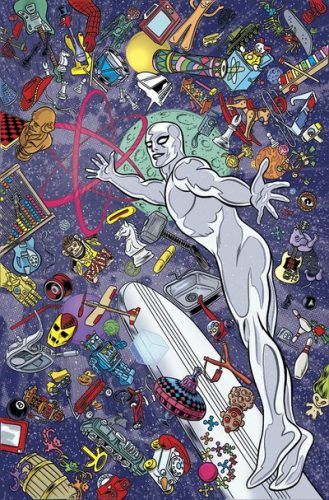
Eugene-based comics artist Mike Allred smiles wide. “I’m a professional child,” he says.
Allred’s understated style turned heads when his Madman hit stores in 1992, paving the way for him to work with many of the best writers in the business as he drew the shiny, spandexed heroes he grew up loving.
A couple years back, when Marvel Comics green-lit a new, light-hearted series based on the classic brooding hero Silver Surfer, editor Tom Brevoort knew instantly this project had Allred’s name written all over it.
Cruising the cosmos at speeds faster than light, his conscience heavy with atrocities committed while enslaved by a planet-eating giant, the Silver Surfer is one of Marvel’s darkest, strangest creations.
As a kid, Allred had the first issue of The Silver Surfer. “We weren’t allowed to take comic books to school,” he says. “So I cut him out of the cover and pasted him on my notebook.”
Mike Allred and his wife, Laura Allred — who colors all of Mike’s illustrations — work from separate studios in their Eugene home.
EW caught up with Allred at Nostalgia Collectibles on Willamette Street, where he’ll sign copies of his new Silver Surfer book on Saturday, Jan. 23.
What’s it feel like to know your work contributes to pop culture?
I don’t give it that much thought, until I go to a comic book show. It’s very flattering that anyone would enjoy what we’re doing. One thing, as far as making an impact, the first issue of X-Force we did [#116, 2001 with writer Peter Milligan] was rejected by the Comics Code Authority.
[Note: The CCA came about as a response to Fredric Wertham’s prudish campaign in the early 1950s to convince parents that comic books were contributing to juvenile delinquency. To get Wertham off its back, the industry set up an outside board to determine what was appropriate to print. Comic book readership fell off steeply after the CCA formed.]Axel Alonso, my editor at the time, and Joe Quesada, who was a publisher for Marvel, told me that the CCA rejected the book. Typically you would make the changes that the code asked for. So of course, I’m thinking, “What do I have to change? What do I have to redraw?” But before I could even complete that thought, I was told we weren’t going with the code anymore. Only once or twice in the past they’d released a book without the Code Authority stamp on it. [The last time was a 1971 issue of The Amazing Spider-Man in which Spider-Man rescues a drug-addled man who falls off a building.] And so the book came out and where the CCA seal normally would be, it said “Hey kids! Look, no code!” So we killed the Comics Code. Everybody else stopped using it after that. As far as making an impact on pop culture, that’s something I’m extremely proud of.
Superheroes are usually all bulging muscles. You draw superheroes with realistic physiques.
It’s important to me to relate to the characters. I want people to relate to the characters.
Something I’ve been wondering lately: Why don’t superheroes have penises?
[Laughs] Mine do! If you look at my Madman character, for example, I don’t draw an outline where you can see the size, and whether it’s laying left or right; but there’s a mass there, like there’d be in real life. I had done Madman for about a year and someone came up to me and said … and said, “I like what’s, uh …” [Allred laughs, shakes his head] This is a weird discussion.Wait. What’d the guy say?
I don’t know if I can repeat it.
Come on.
That there was a banana in the hammock, or something like that. And, I was like, “Well, that’s just life.”
Exactly. If you were in a figure drawing class and you drew every detail but left out the junk, a psychologist might say you have some issues.
That might have something to do with it, too. I took college art classes and, growing up, we had the Andrew Loomis art books and his nude men have penises. There was never any shame or discomfort in that. It just was what it was. Look, just yesterday I was drawing Silver Surfer turning sideways and I thought: Is that too big? Should I bring that back a little? It could be the code, too. I think the code did a lot of damage, particularly in terms of self-censorship. I don’t know. Editors have been given certain lines not to cross. I never had those lines drawn for me. My earliest successes were with my own characters, working for publishers that didn’t have those boundaries or concerns. I was never told I couldn’t draw stuff. So I don’t know.